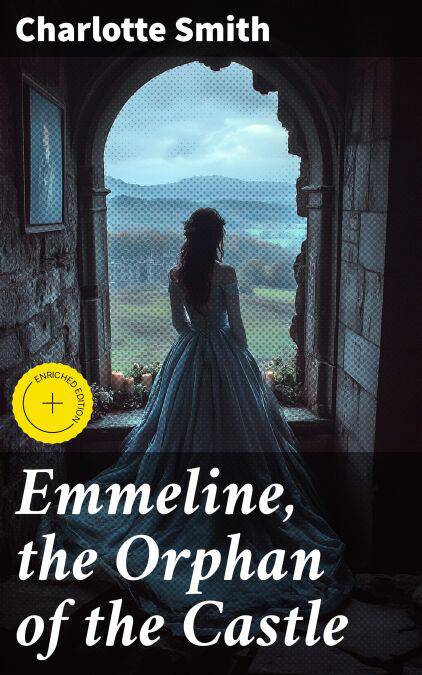
Bedankt voor het vertrouwen het afgelopen jaar! Om jou te bedanken bieden we GRATIS verzending (in België) aan op alles gedurende de hele maand januari.
- Afhalen na 1 uur in een winkel met voorraad
- In januari gratis thuislevering in België
- Ruim aanbod met 7 miljoen producten
Bedankt voor het vertrouwen het afgelopen jaar! Om jou te bedanken bieden we GRATIS verzending (in België) aan op alles gedurende de hele maand januari.
- Afhalen na 1 uur in een winkel met voorraad
- In januari gratis thuislevering in België
- Ruim aanbod met 7 miljoen producten
Zoeken
Emmeline, the Orphan of the Castle E-BOOK
Enriched edition. An Orphan's Struggle in 18th-Century England: A Tale of Love, Loss, and Resilience
Charlotte Smith
E-book | Engels
€ 2,49
+ 2 punten
Uitvoering
Omschrijving
In "Emmeline, the Orphan of the Castle," Charlotte Smith weaves a poignant tale that captures the complexities of identity, societal expectations, and the pursuit of love amidst the backdrop of Gothic romance. Written in 1788, the novel employs rich, evocative prose and intricate character development, exemplifying Smith's adeptness with the sentimental novel genre. Through the lens of Emmeline, a young woman navigating her orphaned status in a morally ambiguous world, Smith critiques the rigid class structures and gender inequalities of her time, drawing upon the Romantic ideals that permeated late 18th-century literature. Charlotte Smith, a pioneering figure in the development of the Gothic novel, experienced her own tribulations, including familial upheaval and financial instability, which undoubtedly informed her depiction of the orphaned Emmeline. Smith's personal struggles, combined with her keen insight into human emotion and societal dynamics, led her to craft stories that echo the feelings of abandonment and longing that resonate with many. Her own experiences with loss, love, and resilience imbue the narrative with authenticity, making it both reflective and relatable. Readers seeking a profound exploration of individual agency within oppressive social structures will find "Emmeline, the Orphan of the Castle" to be a compelling narrative. Smith's masterful storytelling invites readers to empathize with her characters and to reflect upon the broader implications of their circumstances. This novel not only serves as a historical artifact but also as a timeless commentary on the endurance of the human spirit.
In this enriched edition, we have carefully created added value for your reading experience:
- A succinct Introduction situates the work's timeless appeal and themes.
- The Synopsis outlines the central plot, highlighting key developments without spoiling critical twists.
- A detailed Historical Context immerses you in the era's events and influences that shaped the writing.
- An Author Biography reveals milestones in the author's life, illuminating the personal insights behind the text.
- A thorough Analysis dissects symbols, motifs, and character arcs to unearth underlying meanings.
- Reflection questions prompt you to engage personally with the work's messages, connecting them to modern life.
- Hand‐picked Memorable Quotes shine a spotlight on moments of literary brilliance.
- Interactive footnotes clarify unusual references, historical allusions, and archaic phrases for an effortless, more informed read.
In this enriched edition, we have carefully created added value for your reading experience:
- A succinct Introduction situates the work's timeless appeal and themes.
- The Synopsis outlines the central plot, highlighting key developments without spoiling critical twists.
- A detailed Historical Context immerses you in the era's events and influences that shaped the writing.
- An Author Biography reveals milestones in the author's life, illuminating the personal insights behind the text.
- A thorough Analysis dissects symbols, motifs, and character arcs to unearth underlying meanings.
- Reflection questions prompt you to engage personally with the work's messages, connecting them to modern life.
- Hand‐picked Memorable Quotes shine a spotlight on moments of literary brilliance.
- Interactive footnotes clarify unusual references, historical allusions, and archaic phrases for an effortless, more informed read.
Specificaties
Betrokkenen
- Auteur(s):
- Uitgeverij:
Inhoud
- Aantal bladzijden:
- 530
- Taal:
- Engels
Eigenschappen
- Productcode (EAN):
- 4057664622112
- Verschijningsdatum:
- 24/11/2019
- Uitvoering:
- E-book
- Beveiligd met:
- Digital watermarking
- Formaat:
- ePub

Alleen bij Standaard Boekhandel
+ 2 punten op je klantenkaart van Standaard Boekhandel
Beoordelingen
We publiceren alleen reviews die voldoen aan de voorwaarden voor reviews. Bekijk onze voorwaarden voor reviews.









